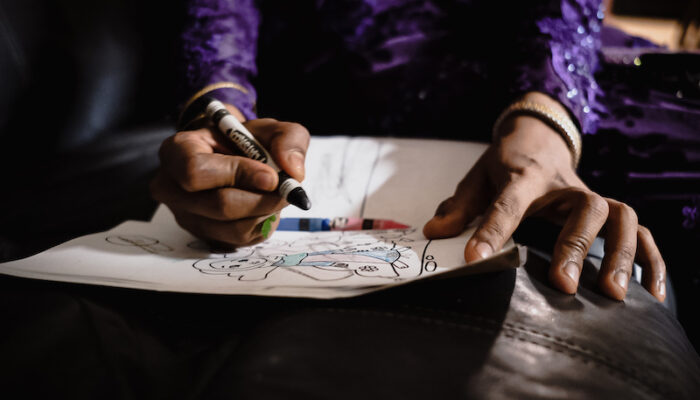Why Cultural Contextualization Matters: Books Unbound’s program with Rohingya girls in the world’s largest refugee camp
The Rohingya Crisis
The Rohingya are an ethnic minority from Rakhine State, Myanmar. Like many other ethnic groups in Myanmar, they have been victims of religious persecution and genocide by the Burmese military. For years, the diaspora has grown as Rohingya flee to neighboring countries for safety and opportunity. In August 2017, an outbreak of violence by the Myanmar military forced over 742,000 Rohingya to flee to Bangladesh. They now live in Kutupalong — the World’s Largest Refugee Camp. There are currently over 1 million people living in Kutupalong, with the vast majority being women and children. According to the UNHCR, 40% are under the age of 12.
Books Unbound and the For the Girls Program
Books Unbound is a humanitarian startup organization that employs a co-creation research process to produce culturally contextualized learning materials to promote informal education movements in refugee communities. They develop Rohingya-specific learning materials that can be used in the home, a learning center, a child-friendly space, or a community center. As Rohingya is an unwritten language, they collaborate with linguists and translators to create a written form of their Rohingya language.
“Do you have a book with girls that look like us?”
Books Unbound’s international team of female artists designed the For the Girls book and Teacher Guide for Rohingya adolescent females as a resource to instigate conversation among their peers regarding women’s health, physical activity, and community-based work throughout all phases of life, regardless of their literacy level. This project was based on requests from Rohingya adolescent girls who had limited opportunity to attend school and already witnessed the implementation of Books Unbound’s Rohingya Picture Dictionary in their community.
Recent Case Study and Impact Report
Utilizing this resource, Books Unbound supports a grassroots program among Rohingya adolescent girls in the refugee camps in Kutupalong, Bangladesh. They recently released a case study report on their findings from the data collected data of 3 three classes, each with 20 students. Sessions lasted 2 – 2.5 hours, with each class completing 24 sessions over one month. Sessions were facilitated by a trusted female community leader and delivered in the Rohingya language.
The report centralizes the perspectives and lived experiences of Rohingya adolescent females while delving into the impact of contextualized resources among refugee communities, able to preserve culture and celebrate strengths while simultaneously addressing community-specific needs. The data collected covers education and learning, physical and psychosocial well-being, hygiene and health, language and culture, and identified benefits of the program.
Highlighted Data on Education
The research results found that while most Rohingya girls have not completed school past grades 1-3 in formal education, they are eager for alternative avenues for learning (at home, with friends, or in community centres). Many girls have materials at home and study collectively, revealing their capacity and potential for education despite delivery disruptions or familial barriers.
Highlighted Data on Culture and Language
Rohingya has been a primarily oral language until recent efforts to preserve it in written form. This is a critical moment for the Rohingya people as their language, now being written, could enable a higher degree of linguistic preservation and increased literacy rates. Books Unbound’s development process ensures its content preserves and represents the community’s language, religious values, culture, and traditions. Below is narrative data on the participants’ reactions:
- “Seeing the girls wearing veil in the cartoon I feel happy because some people don’t like our religion and culture.” -Rohingya student
- “Yes, as I didn’t see anywhere Rohingya language it made me feel like our language and culture is also important.” -Rohingya student
- “I never saw any book with our language and culture. I thought our language is not written anywhere. I felt happy to see our culture in this book.” -Rohingya student
- “Most importantly I learnt Rohingya Alphabet, my mother language. I didn’t know that our language can write. I would like to learn more about Rohingya Language and teach to my community. My community will be very happy and helpful learning the Rohingya Language.” -Rohingya student
Highlighted Data on Program Benefits
Specifically tailored to the refugee camp context and Rohingya cultural background of students, the program was able to address the immediate educational needs by overcoming barriers that traditionally keep girls from learning. The participants highlighted the following three points:
1. An All-Female Environment
“This is the first time I enjoyed my class a lot. Because when we studied anywhere there was girls and boys together and teacher was male as well. So, I didn’t feel comfortable and that’s why my parents stopped me from going to school. And I see this book is only for girls was provided by Books Unbound. I like this book very much. Thank you so much to Books Unbound. I learned so many new things from today’s topics.” -Rohingya student
2. A Credible Communal Network
“This program is so helpful to me. I am not allowed to get out from home. But our teacher is good so I can come here and learn the important things. And thanks to Books Unbound and who are helping to continue this program. I hope all the Rohingya girls will get this training.” – Rohingya Student
3. Private and Trusted Space
“I like the book and program most. I was not allowed to get out from home and study since my period. Now, I feel fortune to get this training. Only coming to her [community leader’s] house is allowed for me.” -Rohingya Student
Promoting a strengths-based approach, Books Unbound identified resilience, an eagerness to learn, and an ability to utilize support networks to mitigate the hardships of camp life.
